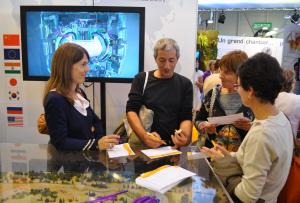Science communication: a genuine scientific field
4 May 2012
-
Michel Claessens, Head of Communication
Experts at the Brussels workshop on science communication stressed that quality and honesty of information, as well as openness, are key. Here, the ITER stand at Foire Internationale de Marseille in September 2010.
The ITER Organization was invited at a workshop in Brussels on Wednesday 25 April to discuss possible orientations for the European Union's (EU) Horizon 2020 Framework Programme, which is likely to make EUR 80 billion available for research projects in a range of selected areas such as climate change, sustainable transport, energy, and food safety. Horizon 2020 will run from 2014 to 2020 and is the EU's flagship initiative aimed at securing global competitiveness.
Interestingly, Horizon 2020 will be open to scientists and industrialists from countries all over the world—not just from Europe.
The workshop was organized by Germany's Fraunhofer Institutes, with a view of providing feedback from various experts to the European Commission, which has the responsibility to propose new EU initiatives.
This was a very constructive workshop, as it addressed many issues that are also relevant to ITER.
For example, one interesting feature of Europe's Framework Programmes is that they support "science and society" activities, i.e., research on gender issues, ethics, and science communication. As Maire Geoghegan-Quinn, the current EU Commissioner for research and innovation, put it: the aim of these activities is "to engage people and civil-society organizations in the research and innovation process" in order to lead to lead to responsible research and innovation.
I was invited to contribute to the workshop and take part in a discussion about future activities in science communication. What are the key challenges in this field? What kind of issues or problems are better addressed through European and international collaboration? Obviously the goal was to identify possible actions at the EU level but it is well known that the decisions taken in Brussels also send strong signals worldwide.
To start with, the results of a public consultation in the EU were disclosed during the meeting. They showed that two-thirds of respondents agree that "science communication will be an integral part of the duties of all European scientists."
Good communication is crucial for major scientific and technological endeavours. Scientists should take an active role (with the help of professional communicators) but this is not the end of the story. Public debates and TV programs on science issues do not always get scientists involved.
Most of these issues are complex ones and the scientific information does not always reach the public. It is not only a matter of communicating the facts, but also making sure that the public understands how scientific knowledge is built, what research is behind the science, etc. This is a big challenge, including for the ITER Project. Experts at the meeting stressed that quality and honesty of information, as well as openness, are key.
One thing is clear: science communication is emerging as a genuine scientific field. Academic research, as well as European and international cooperation, has provided powerful insights on how to engage with the public on science issues. So, what's next? It will be interesting to see to what extent the discussion in Brussels will shape Horizon 2020, which should be adopted at the end of 2013 by the EU Council of Ministers and the European Parliament.
Michel Claessens is coeditor of a just-published book titled 'Science communication in the world.'


